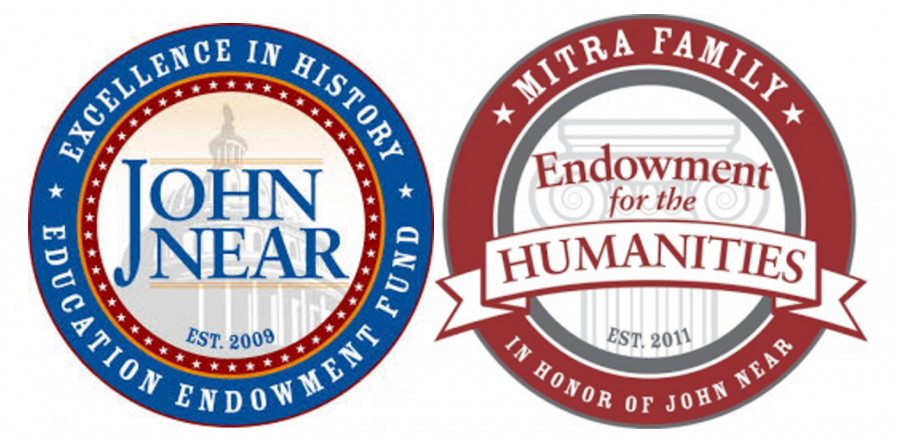Near and Mitra Applicants submit research proposals
Eight Harker seniors who received John Near and Mitra Family Scholar grants presented their papers to friends, teachers and family during a reception on April 25.
April 22, 2016
Current juniors turned in their applications for the John Near Endowment in U.S. History and the Mitra Endowment for the Humanities scholar program on Wednesday online or at the library.
The Near and Mitra programs aim to aid students with the historical research topic they are interested in. The history department and library department selected ten students last year and provided them with a San Jose Public Library card and access to San Jose University resources.
“I think it is an unique opportunity for high school kids to study for a year, and with the guidance of a subject teacher and librarian to help them find the best resources, think about their question in the deepest way, make sure they can pursue the actual interest they have,” library director and co-director of the Near and Mitra program Susan Smith said.
The history department established the Near scholar program in 2009, and sponsors research grants to students each year on topics focused on U.S. History. The Mitra program, sponsored by the Mitra family, was established in 2011 and focuses on world history and the humanities, including literature, art, music and social sciences.
“I think what is more remarkable about [the projects] is just the sheer diversity of topics,” librarian Lauri Vaughan said. “When it first started out they were very much history topics, then there were music topics dance topics, economics topics and now anything anybody dreams up of can be supported.”
Junior Misha Tseitlin hopes to use this opportunity to look further into his own personal identity and heritage.
“My topic stemmed from questions of my ethnonational identity as a Chechen,” he said. “I really liked the idea that I’d be able to get an opportunity to investigate it from an academic point of view and write a full-length research paper on it.”
Junior Raymond Xu based his proposal on research he has done on the World Bank and the exogenous growth model created by Nobel Laureate Robert Solow, which is a main theory in developmental economics.
“Developmental economics and political economics can be combined in an interdisciplinary approach to address pressing social and humanitarian issues such as aid in the developing world,” he said. “Understanding incentives can accelerate the pace of poverty reduction in the Global South by preventing the distortion of aid.”
The library and history department will release the list of next year’s Near and Mitra scholars either Friday next week or the following Monday during school meeting. Selected students will meet with their mentors and librarians to develop a research plan for the summer.


















![“[Building nerf blasters] became this outlet of creativity for me that hasn't been matched by anything else. The process [of] making a build complete to your desire is such a painstakingly difficult process, but I've had to learn from [the skills needed from] soldering to proper painting. There's so many different options for everything, if you think about it, it exists. The best part is [that] if it doesn't exist, you can build it yourself," Ishaan Parate said.](https://harkeraquila.com/wp-content/uploads/2022/08/DSC_8149-900x604.jpg)




![“When I came into high school, I was ready to be a follower. But DECA was a game changer for me. It helped me overcome my fear of public speaking, and it's played such a major role in who I've become today. To be able to successfully lead a chapter of 150 students, an officer team and be one of the upperclassmen I once really admired is something I'm [really] proud of,” Anvitha Tummala ('21) said.](https://harkeraquila.com/wp-content/uploads/2021/07/Screen-Shot-2021-07-25-at-9.50.05-AM-900x594.png)







![“I think getting up in the morning and having a sense of purpose [is exciting]. I think without a certain amount of drive, life is kind of obsolete and mundane, and I think having that every single day is what makes each day unique and kind of makes life exciting,” Neymika Jain (12) said.](https://harkeraquila.com/wp-content/uploads/2017/06/Screen-Shot-2017-06-03-at-4.54.16-PM.png)








![“My slogan is ‘slow feet, don’t eat, and I’m hungry.’ You need to run fast to get where you are–you aren't going to get those championships if you aren't fast,” Angel Cervantes (12) said. “I want to do well in school on my tests and in track and win championships for my team. I live by that, [and] I can do that anywhere: in the classroom or on the field.”](https://harkeraquila.com/wp-content/uploads/2018/06/DSC5146-900x601.jpg)
![“[Volleyball has] taught me how to fall correctly, and another thing it taught is that you don’t have to be the best at something to be good at it. If you just hit the ball in a smart way, then it still scores points and you’re good at it. You could be a background player and still make a much bigger impact on the team than you would think,” Anya Gert (’20) said.](https://harkeraquila.com/wp-content/uploads/2020/06/AnnaGert_JinTuan_HoHPhotoEdited-600x900.jpeg)

![“I'm not nearly there yet, but [my confidence has] definitely been getting better since I was pretty shy and timid coming into Harker my freshman year. I know that there's a lot of people that are really confident in what they do, and I really admire them. Everyone's so driven and that has really pushed me to kind of try to find my own place in high school and be more confident,” Alyssa Huang (’20) said.](https://harkeraquila.com/wp-content/uploads/2020/06/AlyssaHuang_EmilyChen_HoHPhoto-900x749.jpeg)






